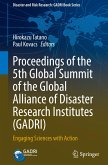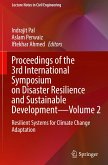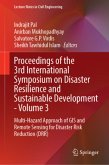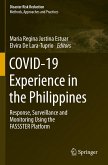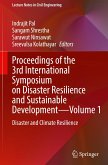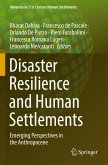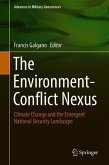This book contains the proceedings of the 6th Global Summit of the Global Alliance of Disaster Research Institutes (GADRI) with the sub-theme of Towards GADRI Objectives of Achieving a Sustainable Disaster-Resilient World . The conference was held at the Disaster Prevention Research Institute (DPRI), Kyoto University, Uji Campus, Kyoto, Japan, 15 17 March 2023.
The prolonged worldwide coronavirus pandemic and cascading risks have taught us that the conventional approach to disaster risk planning and management is ineffective for the development of sustainable and resilient communities. A worldwide pandemic underscores the importance of the following key points:
i) Disaster risk should not be treated in isolation but should be integrated with health risks, climate change, and environmental risks
ii) Objectives and a vision of disaster risk reduction (DRR) should be integrated with sustainable development goals to foster a resilient world
iii) Short-term DRR objectives need to be integrated with a long-term vision and plans for a resilient society
The conference discussions focused on how we could move towards a sustainable and resilient society by integrating the above three aspects in GADRI research and development. There were two panel group discussion sessions. The first session explored how GADRI objectives could contribute to achieving a sustainable and resilient society against disasters using the now-launched committees. The second session took these themes further to discuss new challenges for action by GADRI, based on the following themes:
- Big Science for DRR: Large-Scale Experiments
- Sustainable DRR: Integrating Climate Action, SDGs, Field DRR Experience Sharing New Challenges for Action by GADRI
- Gender and Inclusivity in DRR Policy and Practice
- Putting Health into Disaster Risk Reduction (DRR) and Recovery
- Young Scientists Session on Youth DRR Role of Youth and Young Professionals in Data Knowledge Sharing in Disaster Risk Management
The conference presentations focused on progress, strategies and challenges, discussing how best to play an important role collectively as GADRI to influence the decision-making process for DRR across the board.
The prolonged worldwide coronavirus pandemic and cascading risks have taught us that the conventional approach to disaster risk planning and management is ineffective for the development of sustainable and resilient communities. A worldwide pandemic underscores the importance of the following key points:
i) Disaster risk should not be treated in isolation but should be integrated with health risks, climate change, and environmental risks
ii) Objectives and a vision of disaster risk reduction (DRR) should be integrated with sustainable development goals to foster a resilient world
iii) Short-term DRR objectives need to be integrated with a long-term vision and plans for a resilient society
The conference discussions focused on how we could move towards a sustainable and resilient society by integrating the above three aspects in GADRI research and development. There were two panel group discussion sessions. The first session explored how GADRI objectives could contribute to achieving a sustainable and resilient society against disasters using the now-launched committees. The second session took these themes further to discuss new challenges for action by GADRI, based on the following themes:
- Big Science for DRR: Large-Scale Experiments
- Sustainable DRR: Integrating Climate Action, SDGs, Field DRR Experience Sharing New Challenges for Action by GADRI
- Gender and Inclusivity in DRR Policy and Practice
- Putting Health into Disaster Risk Reduction (DRR) and Recovery
- Young Scientists Session on Youth DRR Role of Youth and Young Professionals in Data Knowledge Sharing in Disaster Risk Management
The conference presentations focused on progress, strategies and challenges, discussing how best to play an important role collectively as GADRI to influence the decision-making process for DRR across the board.


